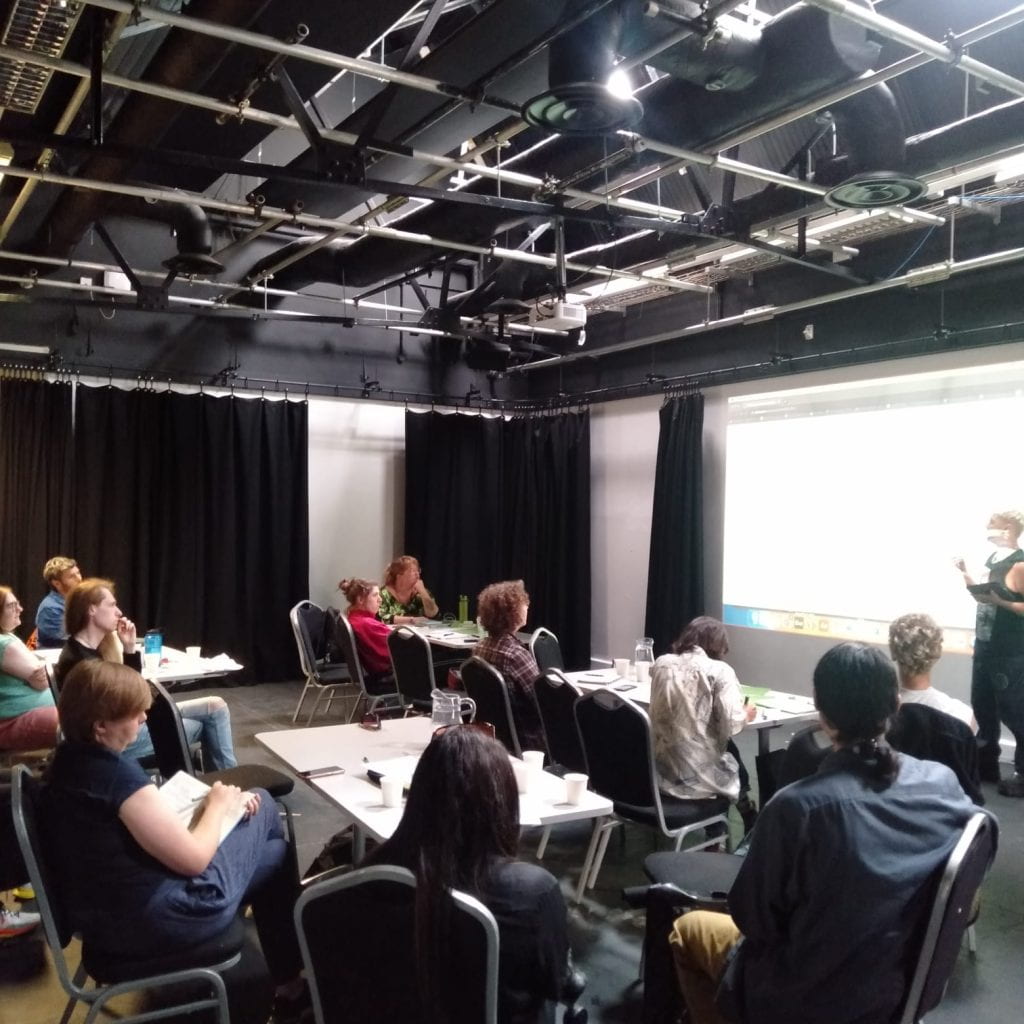Dr Francesco Bentivegna and Katy Dadacz have organised an exciting (and successful!) two-day event called Queer Methodologies in Creative Technologies. on the 29/30th June.
On our first day, we invited MELT (Ren Loren Britton & Iz Paehr) to run an online workshop.
MELT study and experiment with shape-shifting processes as they meet technologies, sensory media and critical pedagogies in a warming world. MELT currently builds projects along four different research tracks: ACCESS SERVER, The Meltionary, Counting Feelings and Zeitgeber. Their arts-design research cooks up practices that generate material and infrastructional transformations that intersect Trans* feminism and Disability Justice. Working with change and MELT(ing) as a kaleidoscope their work engages multiple topics at once: climate change, the potential for political reformulations, critical technical practice and access making. Check out their work and follow them on instagram.
We first learnt about MELT’s new project on wedges- door wedges as ways to rethink who can enter into a space and how we can visualise this. We thought about queer time, did an activity where we listed everything we heard in the room, and then thought about what kind of ritual practices we can have online. In small groups, we thought about things we do everyday that make us feel good, and thinks that happen everyday that don’t make us feel that great. What rituals can we create to ease the everyday?
On our second day, we had a series of micro talks by creative technologists, researchers and artists from the Pervasive Media Studio, the University of Bristol and the University of West England. Each talk finished with an activity for each table to do, rather than a Q&A, which made the process really fun and allowed for more reflections on each of the topics.
Our first speaker was Dr Jacqueline Ristola, who shared with us her work on queer phenomenology and platform cultures- what do the filters we use on apps like TikTok, Instagram and Snapchat do for our sense of self? Do the filters give us a way to experiment with our identities? Or do they reproduce the norms and conventions of gender and sexuality? At the end, we used our own platforms to play around with filters and shared them with the group.
Our second speaker Chloe Meineck shared their incredible work as a queer designer who focuses on co-design and equitable design, with a focus on community building, activism and design justice. Their practice ranges from personal object making, painting to making queer zines. Inspired by queer ecology, they run workshops for their newest project Dictionary of Missing Words. Each table had to do a creative free flow writing exercise or drawing to respond to themes like ‘queer elders’, ‘reciprocal relationship’, ‘we don’t like in a binary world’, ‘queer bonds’, ‘neuro queers’.
Dr Rosie Nelson was our third speaker, who shared with us what queer creativity means, the queer digital and queer methodologies in their own practice; sociology. We thought about digital architectures, digital communities and the way we experience the digital. What kind of things do we need in mind when we create a queer methodology? Rosie suggested principles like emancipation orientated, reflexive and considerate approaches, and being open to novel and creative methods.
We took a break for lunch, and then had two more talks to go!
Harriet Horobin-Worley, a creative software engineer and artist, runs Queer Tech a monthly meet-up for queers who work with technology. They shared their work on low tech solutions, DIY feminist servers, HTMI poems and queer ways of coding. In the activity, we thought about the way we can create our own networks.
Our last talk was by Marcin Gawin, an MA student and artist in Virtual Reality at UWE, on their upcoming project which explored how we can visualise our organs. We thought about the ways in which we can reconfigure the body digitally, and how virtual reality is a way to explore how our organs can be ‘outside’ our body. We speculatively imagined if we had another organ what would we like to have.
Francesco and I (Katy) are also excited to announce that we have received the Seedcorn Funding Award, where we will organise a larger event that will kickstart a standing series of workshops and meetings framed around Queer Resilience through Arts and Creative Technologies. Our idea is to develop regular, affordable, playful, and critical workshop-based meetups and a standing hub to share ideas, trajectories, and strategies for resilience!
Here is a picture of the second day, with Marcin giving his talk,


